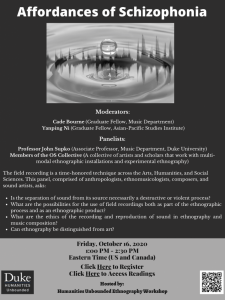Type: Lab
The Graduate Colloquium curates a generative intellectual space in which to discuss emerging themes in cultural anthropology around ethnography. Framing the colloquium is the Ethnography Workshop’s central provocation: an interest in ethnography as experimental as well as documentary. Each colloquia centers around the in-progress work of the Ethnography Workshop Fellows, and unfolds as a conversation in response to their work. For those interested in ethnographic scholarship, the colloquia provides a vibrant space to explore, discuss, and forward these conversations.
Imprisoned & Post-Prison Lives (September 11, 2020)
This session highlighted ethnographic concerns regarding issues of care and recovery among those who are incarcerated—broadly conceived—by the state.
- Shreya Maini, PhD Student, Religious Studies, Duke
- Cody Black, PhD Candidate, Music, Duke
- Leela Prasad, Professor, Religious Studies, Duke
Participants were encouraged to learn about the speaker’s work and offer generative feedback as to how these works may better address and speak to the current moment.
Affordances of Schizophonia (October 16, 2020)
In 1977, composer and scholar R. Murray Schafer coined the term “schizophonia”, which he described as, “the split between an original sound and its electroacoustical transmission or reproduction.” Schafer viewed the separation of sound from its source as inherently destructive and a facet of anxieties regarding the gradual erasure of the sounds of nature and the human voice as a consequence of the technocratic incursion of industrial noise into increasingly dense urban acoustic ecologies.
- Cade Borne, PhD Candidate, Music Department, Duke
- Yanping Ni, MA Student, Asian/Pacific Studies Institute, Duke
- John Supko, Associate Professor, Music Department, Duke
- Members of the OS Collective, a collective of artists and scholars that work with multi-modal ethnographic installations and experimental ethnography
The Field Recording is a time-honored technique across the Arts, Humanities, and Social Sciences. This panel, comprised of anthropologists, ethnomusicologists, composers, and sound artists, asks:
- Is the separation of sound from its source necessarily a destructive or violent process?
- What are the possibilities for the use of field recordings both as part of the ethnographic process and as an ethnographic product?
- What are the ethics of the recording and reproduction of sound in ethnography and music composition?
- Can ethnography be distinguished from art?
Ethnography between Repression and Resilience (November 20, 2020)
Centered around the theme of ethnography as both analytic and creative practice, this session highlights ethnographic possibilities regarding surveillance, capitalism, policing states as well as resilience, refusals, resistance in the occupied West Bank.
- Jake Silver, PhD Candidate, Cultural Anthropology, Duke
- Sophia Goodfriend, PhD Candidate, Cultural Anthropology, Duke
- Lisa Bhungalia, Assistant Professor, Department of Geography, Kent State University
Many disciplines veer into one of two analytic directions when examining colonialism, surveillance, or police states: either structural inquiries into the power of such military systems to determine life, or examinations of how those living in the grasp of such regimes resist, refuse, and cultivate subversive power on their own terms. This colloquium examines if and how ethnography might reconcile these divergent frameworks: Can ethnography balance repression and resilience? Can it offer a portrait of how individuals navigate massive forms of political enclosure with their own ambitions and hopes in mind? In particular, we will explore these questions through ethnographies in the occupied West Bank, though the issues and concerns underlying our conversation resonate far and wide.


